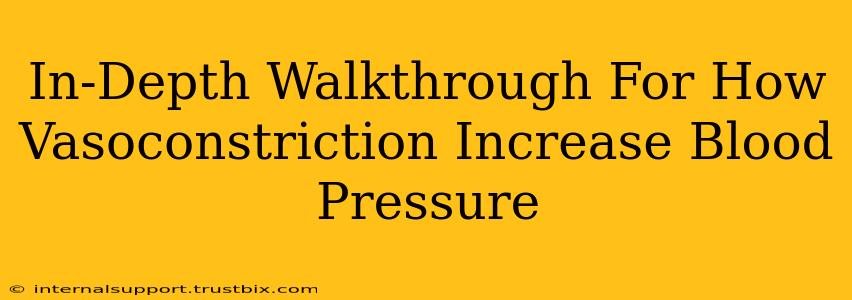Understanding how vasoconstriction impacts blood pressure is crucial for comprehending cardiovascular health. This in-depth walkthrough will explore the physiological mechanisms behind this relationship, helping you grasp the intricacies of blood pressure regulation.
What is Vasoconstriction?
Vasoconstriction is the narrowing of blood vessels, specifically the arteries and arterioles. This reduction in diameter decreases the space available for blood to flow, leading to several downstream effects, most notably an increase in blood pressure. Think of it like squeezing a garden hose – the narrower the hose, the faster and more forcefully the water comes out.
The Players Involved:
- Smooth Muscle Cells: These cells form the walls of blood vessels and are responsible for controlling their diameter through contraction and relaxation.
- Sympathetic Nervous System: This part of the autonomic nervous system plays a key role, releasing norepinephrine, a powerful vasoconstrictor.
- Hormones: Hormones such as angiotensin II and vasopressin (ADH) also contribute significantly to vasoconstriction.
The Mechanism: How Vasoconstriction Raises Blood Pressure
The relationship between vasoconstriction and blood pressure increase is directly proportional. A smaller diameter vessel increases resistance to blood flow (peripheral resistance). This increased resistance forces the heart to work harder to pump blood, leading to a rise in blood pressure.
Key Factors at Play:
- Increased Peripheral Resistance: As mentioned, vasoconstriction significantly increases the resistance to blood flow in the peripheral arteries and arterioles. This is the primary reason for the blood pressure increase.
- Cardiac Output: While vasoconstriction primarily affects peripheral resistance, it can indirectly influence cardiac output. The heart's initial response might be to increase its output to compensate for the increased resistance, further contributing to the pressure rise. However, prolonged vasoconstriction can eventually negatively impact cardiac output due to increased workload.
- Blood Volume: While not a direct cause of vasoconstriction, changes in blood volume can influence blood pressure. Decreased blood volume might trigger vasoconstriction to maintain blood pressure.
Consequences of Excessive Vasoconstriction
Sustained or excessive vasoconstriction can have serious health consequences, including:
- Hypertension (High Blood Pressure): Chronic vasoconstriction is a major contributor to hypertension, increasing the risk of heart disease, stroke, and kidney failure.
- Ischemia: Reduced blood flow due to vasoconstriction can deprive tissues of oxygen and nutrients, leading to ischemia (tissue damage due to lack of blood supply). This is particularly problematic in organs like the heart and brain.
- Angina: In the heart, ischemia caused by vasoconstriction can lead to angina (chest pain).
Understanding the Bigger Picture: Blood Pressure Regulation
Vasoconstriction is just one part of a complex system that regulates blood pressure. The body uses a variety of mechanisms to maintain blood pressure within a healthy range, including vasodilation (widening of blood vessels). Understanding this intricate interplay is essential to effectively manage blood pressure and prevent related health problems.
Factors Affecting Vasoconstriction:
- Stress and Anxiety: The sympathetic nervous system's response to stress triggers vasoconstriction.
- Cold Temperatures: The body constricts blood vessels to conserve heat in cold environments.
- Certain Medications: Some medications, such as decongestants and certain antidepressants, can cause vasoconstriction as a side effect.
- Underlying Medical Conditions: Conditions like Raynaud's phenomenon and hypertension involve abnormal vasoconstriction.
Conclusion
Vasoconstriction's impact on blood pressure is significant. Understanding its physiological mechanism and the factors that influence it is crucial for maintaining cardiovascular health. Regular monitoring of blood pressure, a healthy lifestyle, and seeking medical attention when necessary are vital for preventing complications related to excessive vasoconstriction. Always consult a healthcare professional for any concerns about your blood pressure or cardiovascular health.

